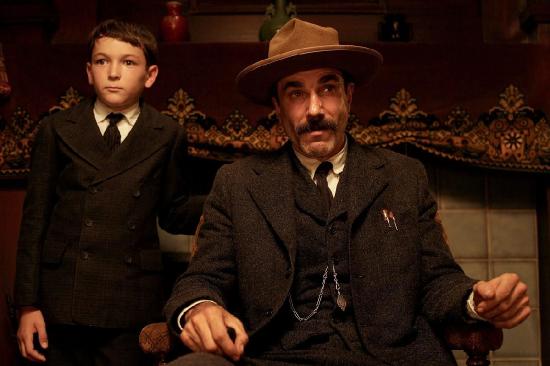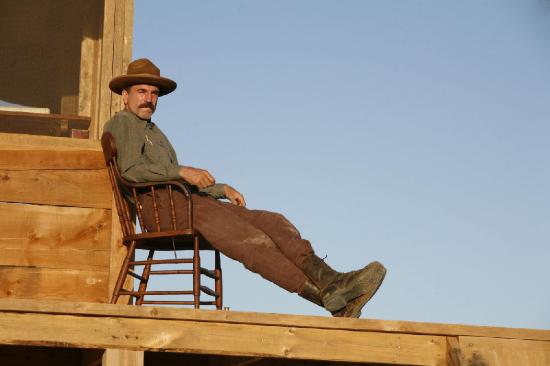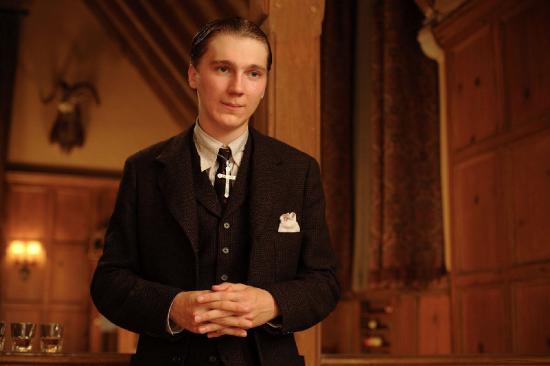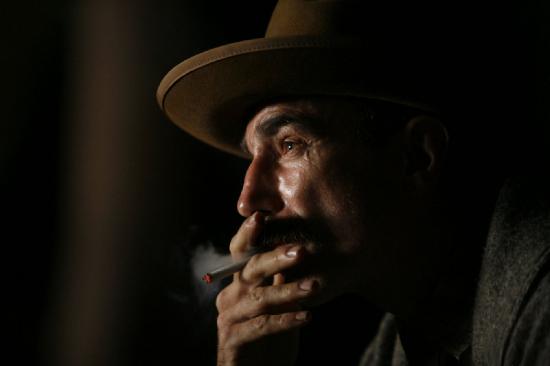There Will Be Blood
Introduction
Paul Thomas Anderson had been very quiet since making Punch Drunk Love in 2002 and obviously found the time to read Oil! by Upton Sinclair. Sinclair's book provided the inspiration for Anderson's next project, rather than forming its backbone. There Will Be Blood tells about the discovery of oil in California, the loss of innocence of the state and the part played in the transformation by Daniel Plainview (Daniel Day-Lewis).
For the first half hour or so, you have no idea in which the film is heading: there is no dialogue in the first 20 minutes as Plainview mines for silver in a shaft that he seemingly dug himself and he falls, breaks his leg and drags himself, leg in a splint, to the nearest town where he stakes a claim to the area. The film moves on several years from 1898 when Plainview and some other men in a small oil shaft, bringing the viscous substance to the surface in buckets, with one man dying in an accident and leaving Plainview to bring up his infant son. Several years later, Plainview is approached by a young man, Paul Sunday (Paul Dano) who, in exchange for $500, tells him that his family's farm is situated on ground where oil seeps to the surface.
After a brief reconnaissance in which Plainview and his adopted son H.W. pretend to be hunting quail, Plainview asks the Sundays if he can buy their land and is introduced to the headstrong Eli Sunday, Paul's brother (also played by Dano). Eli tells Plainview that he doesn't believe he wants the land for quail hunting and forces the price of the property higher and demands that a church is built in the town as a condition for sale. Having secured the land, Plainview goes directly to the real estate agents and quickly buys all the land surrounding the Sunday's property.
The land is sitting on an ocean of oil, Plainview strikes it rich and the film follows his obsession with crushing all competition and his ongoing battle with Eli, a firebrand preacher.
Video
There Will Be Blood is a stunning film, with some amazing scenes and incredible period detail. Robert Elswit's cinematography is gorgeous and the 1080p picture does the film full justice, showing the immense vistas and dark close ups in equally fine detail.
*The pictures contained in this review are for illustrative purposes only and do not reflect the image quality of the disc.*
Audio
I would have loved to have watched this with the uncompressed PCM 5.1 track but I do not have the AV equipment to play it. Instead, I listened to the Dolby Digital 5.1 which is, to my untrained ear, spectacular. The sound design is excellent and Jonny Greenwood (of Radiohead fame) marks his film debut with an eclectic and quite brilliant score. The range of music from strings, to discordant guitars and drums fit beautifully with the emotion of the film.
Extra Features
There are no 'on set' extras, which isn't surprising given Daniel Day-Lewis' aversion to the media and his custom of following the 'method' school of acting, staying completely in character throughout the shoot. The supplementary material largely focuses on the historical nature of oil in America with The Story of Petroleum film (circa 1923) and another short showing the development of the oil industry in the US. These have new scores by Greenwood and told me much more about domestic oil production than I previously knew. The only contemporary materials are trailers, some deleted scenes and 15 minutes of photos and other research material, annotated, probably by P. T. Anderson.
Conclusion
Paul Thomas Anderson is one of those rare directors who have yet to make a 'duff' film - no matter how ambitious or odd the project, he has succeeded with each outing and There Will Be Blood is probably his most impressive film to date.
When the Oscar nominations were announced I figured that Day-Lewis was a cert for Best Actor and the main awards would either go to this or No Country For Old Men. The Coen brothers' film won out but this is at least as good as their neo-noir western. Seemingly channelling John Huston from Chinatown, Day-Lewis is immense and ably supported by Paul Dano (last seen in Little Miss Sunshine) whose Eli matches Plainview in ambition but doesn't seem to have the guile and ruthlessness of the older man. The clashes between the two are memorable, particularly Plainview trading a baptism for a pipeline and his extraordinary beating of Eli, when he slaps and kicks the preacher before grabbing him by the hair and dragging him into a pool of oil.
Putting the quality of the acting aside, the technical aspects are mind blowing: Anderson's direction is phenomenal, the cinematography by Robert Elswit is stunning and the extensive research gives the film a tangible authenticity. The character of Plainview is a larger than life man, whose relentless pursuit of wealth is matched only by his hatred of competition, transforming him into a combination of Charles Foster Kane and Jett Rink (from Citizen Kane and Giant respectively).
When I saw it in the cinema, I said that I needed to see it again and the same applies after watching it at home - Paul Thomas Anderson has created a film of such depth and intelligence that it's almost impossible to take it all in one screening. The film resonates with contemporary religion and politics in such a thought-provoking way that it demands repeated viewing and, despite the relative paucity of extra material on the disc, comes highly recommended.




Your Opinions and Comments
Be the first to post a comment!